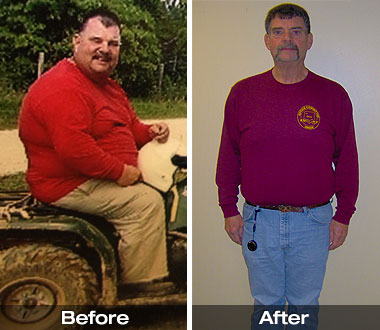The last time Glynn weighed 200 pounds was in the mid-1960s, when he was a freshman in high school. He started putting on weight as a young adult, and it just kept coming. He had been so big, for so long, that he had almost forgotten what it was like not to struggle to bend over, or even walk.
By his 50s he was topping 400 pounds, rendering his job difficult as a mechanical journeyman at a union hall in Columbus, Ind., and making his feet ache constantly.
“When I dropped something before, I wouldn’t even pick it up. When I would drop a quarter at the vending machine, it was gone. I didn’t go get it,” he said with a chuckle.
But beyond making life uncomfortable, his obesity represented a serious threat to his health. Glynn developed diabetes at a young age — an ailment that seriously afflicted other members of his family.
“My dad was miserable the last years of his life. My uncle lost both his legs,” he said.
With a wife, Rhonda, two children and two grandchildren, Glynn realized he had a responsibility to other people in his life, too. So after talking with some co-workers for their advice, he went to the Weight Loss Institute of Columbus Regional Health.
After the normal screening procedures and assessment period, Glynn underwent the Roux-en-Y gastric bypass surgery in early 2011. Twenty months out from the procedure, he’s wearing clothes in sizes he hadn’t used since his teenage years.
Now age 60, Glynn said the staff at the Weight Loss Institute allayed all his concerns going into the surgery, so he entered the operating room with total confidence — and hope for a better and longer life.
“When I was getting ready to do this, I was ready to get it done. There was no hesitation at all. I knew I was going to die at some point here. So I figured this was a chance to live a little longer and help raise my granddaughters.”
Today his blood sugar levels are consistently normal, and he no longer takes any diabetes medication. Glynn considers his diabetes “fixed” by the gastric bypass surgery and subsequent changes in diet.
The day he got out of the surgery, Glynn started keeping a daily food journal at the urging of the Weight Loss Institute staff. He logs everything he eats, and monitors his weight constantly. If there is a change, he can go over his journal to see where there was a spike in intake. He consults regularly with dieticians at the Institute, who make suggestions such as altering how much iron or protein he’s eating.
“I think the journal’s been very important. It keeps me honest — because that way you’re not lying to yourself,” Glynn said. “If I put a pound or two on, I get right on it and get the weight back off.”


